Aldhelm Preface
ALEXANDRAREIDER
Date: Fri 07 Jan 2022Arbiter, aethereo iugiter qui regmine sceptrA
Lucifluumque simul caeli regale tribunaL
Disponis moderans aeternis legibus illuD,
(Horrida nam multans torsisti membra VehemotH,
Ex alta quondam rueret dum luridus arcE),
Limpida dictanti metrorum carmina praesuL
Munera nunc largire, rudis quo pandere reruM
Versibus enigmata queam clandistina fatV:
Sic, Deus, indignis tua gratis dona rependiS.
Castalidas nimphas non clamo cantibus istuC
Examen neque spargebat mihi nectar in orE;
Cynthi sic numquam perlustro cacumina, sed neC
In Parnasso procubui nec somnia vidI.
Nam mihi versificum poterit Deus addere carmeN
Inspirans stolidae pia gratis munera mentI;
Tangit si mentem, mox laudem corda rependunT.
Metrica nam Moysen declarant carmina vateM
Iamdudum cecinisse prisci vexilla tropeI
Late per populos illustria, qua nitidus SoL
Lustrat ab oceani iam tollens gurgite cephaL
Et psalmista canens metrorum cantica vocE
Natum divino promit generamine numeN
In caelis prius exortum, quam Lucifer orbI
Splendida formatis fudisset lumina saecliS.
Verum si fuerint bene haec enigmata versV
Explosis penitus naevis et rusticitatE
Ritu dactilico recte decursa nec erroR
Seduxit vana specie molimina mentiS,
Incipiam potiora, sui Deus arida servI,
Belligero quondam qui vires tradidit IoB,
Viscera perpetui si roris repleat haustV.
Siccis nam laticum duxisti cautibus amneS
Olim, cum cuneus transgresso marmore rubrO
Desertum penetrat, cecinit quod carmine DaviD.
Arce poli, genitor, servas qui saecula cunctA,
Solvere iam scelerum noxas dignare nefandaS.
Incipiunt enigmata ex diversis rerum creaturis composita.
Judge, who with celestial control perpetually arranges the sceptres
And the resplendent royal court of heaven,
Directing it with eternal laws,
(For you tormented the horrible limbs of Behemoth
When the foul beast had fallen from the lofty heights),
Now, to me, who composes vivid songs in verse, protector,
Bestow gifts, so that I, unrefined, may be able to explain
Through your word the hidden mysteries of things in my verses:
Thus, God, do you freely offer your gifts to the unworthy.
I do not summon the Castalian nymphs here,
Nor did a swarm of bees spread nectar in my mouth;
Thus never do I traverse Apollo’s summits, and I did not
Prostrate myself on Parnassus, and I did not see visions:
For God will be able to enhance my poetic song,
Freely breathing his blessed gifts into my unlearned mind;
If he should touch my mind, immediately my heart returns praise.
For metrical verses declare that the prophet Moses
Sang, a long time ago, of the standards of ancient
Victories, distinguished among peoples far and wide,
Where the bright sun shines, raising its head from the ocean’s waters;
And the psalmist, singing the verses of his songs aloud,
Declares born through divine generation a deity
Who appeared in the heavens before the morning star
Poured its splendid light on the earth at the world’s conception.
But if these mysteries in verse should indeed be well and truly
Freed from defects and inelegance as well as correctly
Sequenced in the dactylic style, and error did not
Lead astray my mind’s efforts with specious show,
I will begin upon better things, if God, who once
Imparted strength to his soldier Job, should replenish
The arid insides of his servant with a drink of eternal dew.
For you once brought streams of water out from dry rocks
When the throng, after crossing the Red Sea,
Entered the desert, which David sang of in song.
Father, who protects all ages in the castle of heaven,
Deign now to free me from the unspeakable faults of my sins.
Here begin the riddles composed about various created things.
Notes:
This edition is based on Rudolf Ehwald, ed. Aldhelmi Opera Omnia. Monumenta Germaniae Historica, Auctores Antiquissimi, 15. Berlin, Weidmann, 1919, pages 59-150. Available online here.
Tags: anglo saxon riddles latin Aldhelm
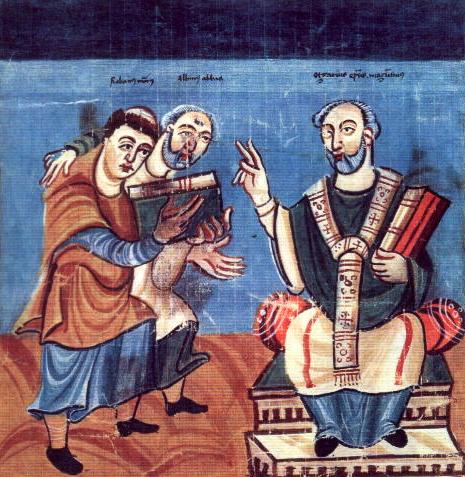


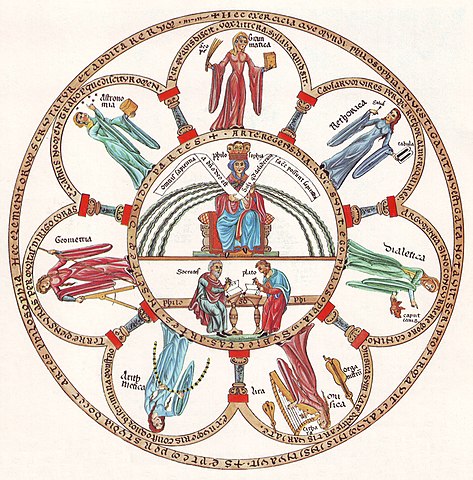
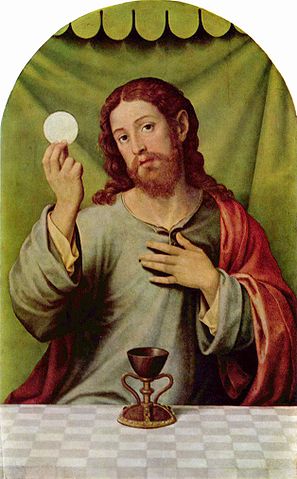
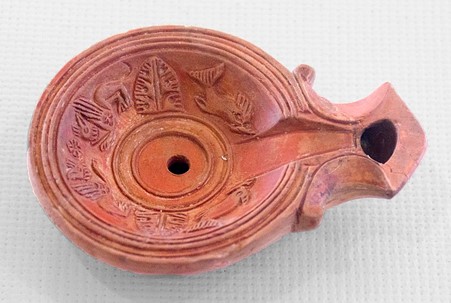
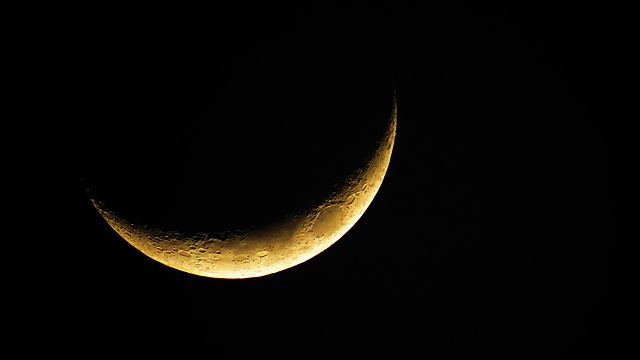


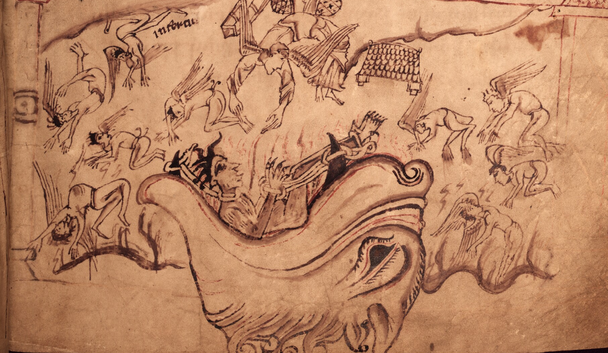
Commentary for Bern Riddle 1: De olla
NEVILLEMOGFORD
Date: Fri 11 Dec 2020Matching Riddle: Bern Riddle 1: De olla
Storms! Philosophy! God! Heaven! Humankind! These are some of the suitably epic subjects that other medieval riddle collections begin with. The first of the Bern riddles, on the other hand, is all about the humble clay pot. But this does not mean that Bern Riddle 1 is mundane. In fact, it is quite the opposite—it describes an ordinary object in very unexpected and fantastical ways.
Pottery is one of the oldest and most important human technologies. Once you learn that clay hardens when baked at high temperatures, you can create all kinds of lovely things—bowls, flasks and jugs, as well as lamps, weights and figurines, and bricks and tiles. Oh, and pots!
Before I start on the riddle, here’s a very brief potted history… of pottery.
Early medieval pottery is incredibly diverse, and it varies greatly by region and time, depending on the material, design, and technologies involved. For example, in England, pottery from the 6th and 7th centuries was typically made on a small scale, shaped by hand, and fired on bonfires. The pottery wheel was introduced by the 9th century and production became more specialised. By the 10th century, a lot of pottery was produced in towns, often using techniques such as wheel-throwing and large, chimneyed kilns.
In Lombardy, where some scholars think the Bern riddles were written, the situation was more complex still, but the general pattern was the same. The turbulent 7th century brought a general decline in quality, but wheels continued to be used in many places, and the pottery industry expanded again from the 800s onwards alongside the newly expanding cities.
Anyway, enough history—let’s get back to the riddle! As with most of the Bern riddles, it is written from the perspective of the object—a technique known as prosopopoeia. The pot riddle is the first of eleven riddles on domestic subjects, and the riddle-creator may have been influenced by chapter XX of Isidore of Seville’s very influential, 7th century encyclopedia, The Etymologies (Salvador-Bello, pages 257-8). On a less scholarly note, when I think of these riddles, I immediately think of the anthropomorphic Mrs Potts, Lumiere and co. in Disney’s Beauty and the Beast. Prosopopoeia is still very relevant in our culture today.
Lines 1 and 2 are all about the material of the pot. They challenge us to explain how a daughter can have two fathers, one immortal and the other mortal. Some readers will know that Latin has three genders—masculine, feminine, and neuter. In these riddles, the grammatical gender of the solution is often depicted in terms of human gender identity. For example, the Latin for pot (olla) is feminine, and so the pot becomes a daughter (nata) rather than a son (natus). The same is true about the fathers. The father who dies is probably fire (ignis) and the father who endures is probably clay (limus)—both words are grammatically masculine. Alternatively, Thomas Klein has argued that the father who dies is the maker of the pot and the father who lives is fire or heat (Klein, pages 407-8).
Lines 3 and 4 explain how the clay is softened, shaped and spun. The single word giro (literally “in a circle”) tells us that the riddler was familiar with pottery wheels—which would fit nicely with the idea that the Bern riddles were written in Italy. The mother in line three could be the hand (manus) that kneads the clay or the water that softens it (aqua). This depends on how we understand the word dura (“hard”), which can refer to either the mother or the child.
Just like the Exeter Book riddles, the Bern riddles sometimes use innuendo. Line 3 tells us that a soft thing is twisted into a “suitable form.” This reminds me of the stiþes nathwæt (“something stiff”) of Exeter Riddle 54. It also makes Bern Riddle 1 a medieval precursor to the sexy pottery scene in the popular 1990s film Ghost .
The final two lines refer to the firing of the pot in a kiln or open fire (“when warmed”), which is needed before it can feed people. The riddle then closes with the offer of food to everyone. Thanks, pot—don’t mind if I do!
Bern Riddle 1 is the perfect introduction to the Bern riddles. It contains many of the themes and motifs that we find elsewhere in the collection: children and parents, life and death, feeding and food-giving, the body, and opposites. And, just like the other riddles, it still captures our imagination today, through its uncanny knack of making ordinary objects seem extraordinary and wondrous.
References and Suggested Reading:
On early medieval pottery
Hamerow, Helena. “Pottery.” In The Wiley Blackwell Encyclopedia of Anglo-Saxon England. Edited by Michael Lapidge, John Blair, Simon Keynes, and Donald Scragg, Second Edition. Chichester: Whiley-Blackwell, 2014. pages 381-3
Wickham, Chris. Framing the Early Middle Ages: Europe and the Mediterranean, 400-800. Oxford: Oxford University Press, 2005. pages 728-741
On the riddle
Klein, Thomas. “Pater Occultus: The Latin Bern Riddles and Their Place in Early Medieval Riddling.” Neophilologus 103 (2019), pages 339-417.
Röösli, Samuel. “The Pot, the Broom, and Other Humans: Concealing Material Objects in the Bern Riddles.” In Secrecy and Surveillance in Medieval and Early Modern England. Edited by Annette Kern-Stähler & Nicole Nyffenegger. Swiss Papers in English Language and Literature (SPELL), Vol. 37 (Tübingen: Gunter Narr Verlag, 2020), pages 87-104.
Winferfeld, Paul. “Observationes criticalae.” Philologus vol. 53 (1899), pages 289-95.
Tags: latin Bern Riddles
Related Posts:
Commentary for Exeter Riddle 54
Bern Riddle 1: De olla